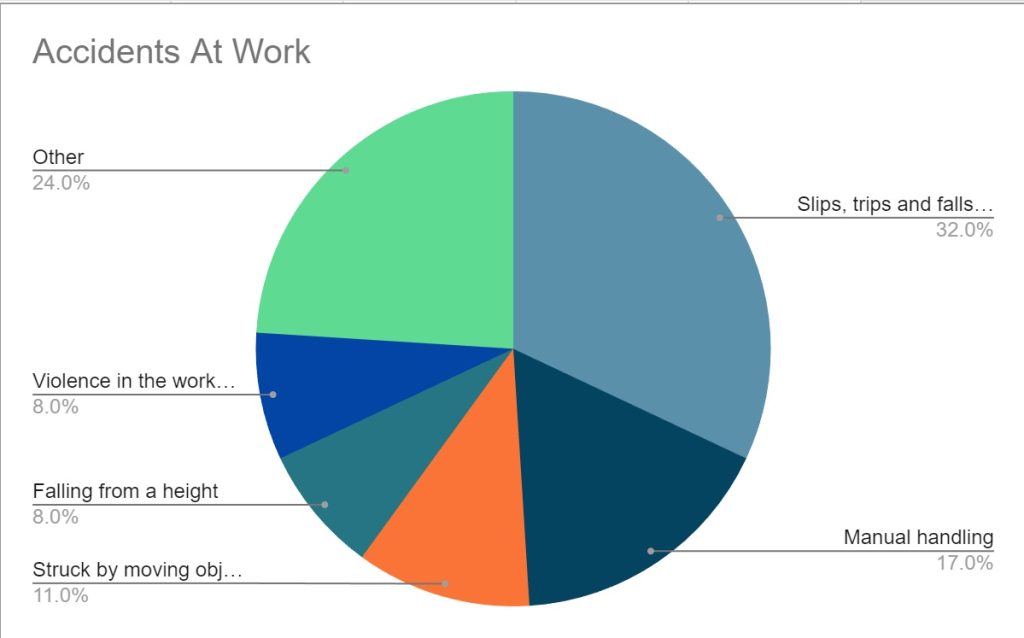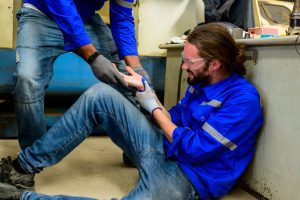If you have been injured in an accident whilst at work and it wasn’t your fault, you may be able to claim compensation. Injuries at work could be caused by employers failing to apply health and safety laws or rules properly. If this is the case, you are well within your rights to explore the option of bringing forward an accident at work claim.
Within this guide, we will cover when you could be eligible to make a personal injury claim following a workplace accident and the different types of accidents that could happen. Following this, we discuss what steps you could take after being injured in the workplace to support your claim and how long you have to start a claim.
Additionally, we share how your compensation may be calculated, the different damage you could be awarded and how one of our experienced No Win No Fee solicitors could help you claim this compensation.
We can help you with your claim. For more information on how we could help you, please contact our team. You can contact us by;
- Using the live chat on this page.
- You can use our online form to start a claim.
- Or you can call our team on 0800 073 8801.
Jump To A Section
- What Is An Accident At Work Claim?
- What Are The Most Common Accidents At Work?
- What Accidents Could Happen At Work?
- What Should I Do After An Accident At Work?
- How Long Do I Have To Claim For A Workplace Accident?
- Can I Claim For Workplace Injuries On Someone Else’s Behalf?
- Can I Claim For A Workplace Accident That Was Partly My Fault?
- How Much Compensation Can I Claim For An Accident At Work?
- Claim For An Accident At Work On A No Win No Fee Basis
- More Resources About Claiming Accident At Work Compensation
What Is An Accident At Work Claim?
An accident at work claim is a way to seek compensation from your employer if their negligent actions caused you to be injured in a workplace accident. They have a duty of care to, as far as it is reasonable to do so, ensure your safety and welfare at work. This comes from the Health and Safety At Work etc. Act 1974 (HAWASA). What is reasonable will depend on the circumstances but can include things like providing you with training or necessary personal protective equipment (PPE).
Many specific health and safety laws apply to you as an employee, and the steps employers should take include things like:
- Providing suitable PPE under The Personal Protective Equipment at Work Regulations 1992.
- Maintaining suitable work equipment under The Provision and Use of Work Equipment Regulations 1998.
- Properly planning and supervising work at height under The Work at Height Regulations 2005.
Other specific duties exist, and there are many valid grounds for a claim; we will look at some specific examples in a future section.
To make an accident at work compensation claim, you will need to show that,
- Your employer owed you a duty of care.
- They have breached your duty of care to you.
- As a result of this breach, you suffered an injury.
So, if, for example, you have suffered injuries due to no training at work, you could likely sue your employer for negligence. Please get in touch with our team to learn more.
What Are The Most Common Accidents At Work?
The Health and Safety Executive (HSE) is Britain’s national regulator for workplace health and safety. They carry out regular assessments of the rates of illness, injury and accidents (including non-fatal and fatal) in the UK. Using data from HSE statistics, we can see that the most common types of workplace accidents that cause injury are:
- Slips, trips and falls on the same level (32%). Damaged walkways, spillages or poor lighting could all lead to slips, trips and falls at work.
- Accidents whilst handling, lifting or carrying (17%). Manual handling accidents could happen in medical or care settings where you need to lift patients, in a warehouse where you have to lift and carry heavy objects or even in an office. Employers must provide training (and any necessary equipment) to carry out manual handling operations safely.
- Being struck by a moving object (11%). You could be struck by a moving object, such as a pallet truck, which has not been properly secured or where the operator was not properly trained. You could also be hit by heavy boxes falling from a height.
- Falling from a height (8%). You may have fallen from a broken ladder at work or fallen due to defective scaffolding.
- Violence in the workplace (8%). You could be assaulted by a customer in a shop, a patient in a care setting or, in extreme cases, by a co-worker.
Here is a visual representation of this data:

What Accidents Could Happen At Work?
To claim against your employer, you will need to show that they have breached their duty to you. Examples of this, which could lead to accidents at work (and thus a workplace injury claim), could include;
- Failing to carry out risk assessments on a regular basis or failing to adequately deal with risk identified. E.g. a scaffolding site is not risk assessed, leading to a platform being constructed on uneven ground, which causes it to wobble and you to fall, breaking your leg.
- Not providing you with any necessary PPE. E.g. You are not provided safety goggles when cutting metal, and a fragment gets in your eye, causing injury.
- Failing to make sure that any dangerous machinery at work is correctly maintained. This could lead to it malfunctions and you suffering an amputation.
- Not ensuring that objects are correctly and safely stored, such as those which are stored at height. This could lead to you suffering a crush injury if these objects were to fall on you.
- Failing to maintain flooring, walkways and stairways properly. Obstructions, defects or spillages could all lead to accidents and injuries.
These are only a few examples. For more information on things you should know about accident at work claims, please contact our team.
What Should I Do After An Accident At Work?
If you have suffered workplace injuries in an accident there are steps that you could and should take. The first and most important step that you should take after being injured at work is you get any medical attention that you require. You could also request a copy of your medical records after this appointment to use as evidence in your claim.
Additional supporting evidence may include,
- Witness contact information so they can be approached later on for a statement.
- A copy of your accident report in the accident book.
- Photographs of the cause or scene of the accident or of your injury.
- Video (such as CCTV footage) which shows the incident taking place.
Our team is experienced in helping people to prove their accident at work claim. For more information on what evidence could support an accident at work compensation claim and whether one of our solicitors could help you gather this evidence, please get in touch with our team.
How Long Do I Have To Claim For A Workplace Accident?
The amount of time you have to make an accident at work compensation claim (or any personal injury claim) is set out in The Limitation Act 1980.
For most instances, the relevant work accident claim time limit is three years from the accident date. However, there are instances in which the time limit may vary, and we cover the main two exceptions in the next section: people under 18 and those who lack mental capacity.
To see whether you have enough time to begin your accident at work claim, contact our advisors.
Can I Claim For Workplace Injuries On Someone Else’s Behalf?
There are certain instances where you may be able to make a claim on someone else’s behalf. This is for claims where:
- The person injured is under the age of eighteen.
- The injured person lacks the mental capacity to make a claim (for example, due to a serious brain injury).
In such cases, you could apply to be or be appointed by the court as a litigation friend. The court will check that you are a suitable person, such as a parent, guardian, or family member. They will also check that you do not have a conflict of interest and can act in the best interest of the injured person.
To find out how to make work injury claims on behalf of another person, please contact our team.
Can I Claim For A Workplace Accident That Was Partly My Fault?
You could be able to make a workplace accident claim even if you were partially at fault. However, your damages would be reduced to reflect that you were also the partial cause of the accident.
For example, if your employer made you operate a known faulty forklift, and you operated this forklift in a dangerous manner, causing the forklift to crash, you could be deemed as partially responsible for your accident.
Liability can be split in any portion that adds up to 100%, e.g. 50/50 or 75/25. So, if you are 50% responsible for your accident, you would only receive 50% of the compensation you would have received had you not been deemed liable at all.
It is also possible in accidents at work for there to be a finding of contributory negligence. This means that whilst you did not cause the accident in any way, you contributed to your injuries by failing to do something.
For example, your employer fails to risk assess a task correctly, and someone on a raised platform drops something that hits you on the head. This is not your fault; however, you were not wearing your hard hat that was provided by work, and you now have injuries that are worse than they would have been if you had used the PPE provided. The court could find that you contributed to your injuries and might apply a reduction of, for example, 25% to your damages.
Even if you think you were partly at fault for your accident, we would like to hear from you as you can still potentially make a claim.
How Much Compensation Can I Claim For An Accident At Work?
There is no ‘average amount’ of compensation awarded for an accident at work, as each injury is unique. In general, your final work injury compensation settlement may include two types of damages. These are;
- General damages – awarded based on your pain and suffering for the injuries.
- Special damages – awarded based on the financial impact that the injury has had on you.
General damages may be calculated using the Judicial College (JC) guidelines. The JC guidelines provide guideline compensation amounts for various injuries.
In the table below, we have included examples of what may be awarded for different types of injury with figures from the JC guidelines. Please be aware that the figure in row one does not come from the JC guidelines.
| Type Of Harm | Severity | Injury Notes | Compensation |
|---|---|---|---|
| Multiple and serious injuries with large financial losses. | Very Severe | Awarded for multiple and severe forms of injury as well as special damages for medical expenses, lost earnings and travel costs. | Up to £1,000,000+ |
| Brain injury | (B) Moderately severe | Compensation awarded may depend on life expectancy, degree of physical limitations, ability to communicate. | £267,340 to £344,150 |
| Back injury | (A) Severe (i) | Severe spinal cord and nerve root damage. Very serious consequences for the person. | £111,150 to £196,450 |
| Leg injury | Severe (B) (ii) Very Serious | Permanent injuries affecting mobilty and quality of life. | £66,920 to £109,290 |
| Arm injury | (B) Permanent and substantial disability. | A serious bone fracture of the forearm (one or both). | £47,810 to £73,050 |
| Foot injury | (E) Serious | Including less severe forms of foot injury but which does cause continuing pain. | £30,500 to £47,840 |
| Hand injury | (H) Moderate | A penetrating wound, crush injury or other soft tissue injury. Includes impairment of function. | £17,640 to £35,390 |
| Elbow injury | (C) Moderate to minor | This includes most types of elbow injury. It could include injuries as diverse as tennis elbow or a fracture. | Up to £15,370 |
| Wrist injury | (D) Fracture or soft tissue injury | Where recovery takes over 12 months. Complete or largely complete. | £7,420 to £12,630 |
Can I Claim For Loss of Earnings In A Work Accident Claim?
Special damages are designed to take account of various financial losses and costs which could be incurred due to workplace injuries.
Costs and losses which you may be able to claim could include;
- Income lost due to time taken off work. This may include both past and future losses.
- The cost of treatment, such as medical care, physiotherapy or psychological treatment.
- The cost of travelling to and from appointments.
- Other costs associated with your injury, such as adapting your home or vehicle. This may also include any mobility aids or specialist equipment.
Evidence will need to be presented of these costs in order to claim them back. This could include payslips and receipts, for example.
Find out more about work injury claims by contacting a member of our team today.
Claim For An Accident At Work On A No Win No Fee Basis
When you contact our team about your accident at work claim we will assess your case. We will then advise you if we think you have a valid claim. If we think that you do, we can connect you to one of our No Win No Fee solicitors.
Our No Win No Fee solicitors work with their clients under a Conditional Fee Agreement (CFA). This means that you will not need to pay anything for your solicitor’s services prior to making a claim or while the process is underway. You also will not need to pay for their services if the claim is not a success.
If you win your workplace injury claim, you will be charged a success fee by your solicitor. This will be an agreed-upon percentage of the compensation. How much may be charged is limited by law.
For more information on how to claim for an accident at work, please contact our specialist team:
- Talk to us using the live chat on this page.
- Contact us online and we can get back to you.
- Or call an advisor now on 0800 073 8801.
More Resources About Claiming Accident At Work Compensation
Below, we have included further information on making a personal injury claim for accidents at work:
- View examples of fatal accident at work compensation payouts in this guide.
- Learn how to make an unsafe work area claim in this guide.
- Here we look at how to make an agency worker accident at work claim.
- Also, check bin man injury claims guide
References about personal injury claims:
- Check your entitlement to Statutory Sick Pay in this government resource.
- Information from the Health and Safety Executive on reporting accidents at work.
- Data on fatal injuries at work can be found in this government resource.
Our team could help you make an accident at work claim. For more information on work injury compensation claims, contact us today.






